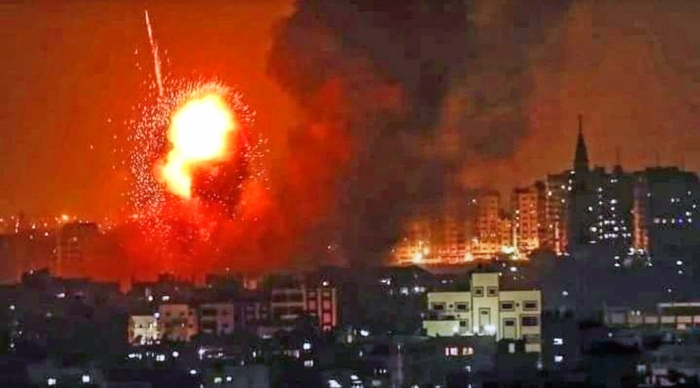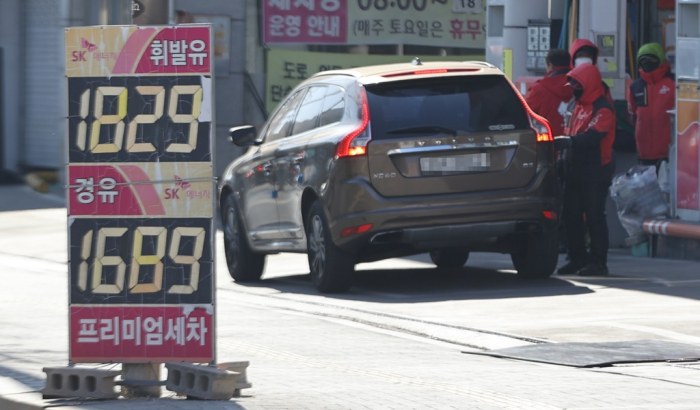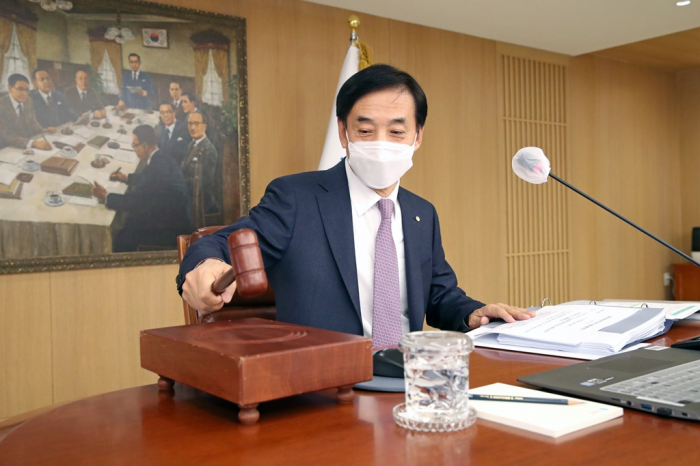Economy
BOK sees inflation at 11-year high as oil tops $100 on Ukraine crisis
Korea central bank raises inflation forecast for this year to 3% based on predicted average crude import cost of $85 a barrel
By Feb 24, 2022 (Gmt+09:00)
3
Min read
Most Read
LG Chem to sell water filter business to Glenwood PE for $692 million


Kyobo Life poised to buy Japan’s SBI Group-owned savings bank


KT&G eyes overseas M&A after rejecting activist fund's offer


StockX in merger talks with Naver’s online reseller Kream


Mirae Asset to be named Korea Post’s core real estate fund operator



South Korea’s central bank expects consumer inflation to hit an 11-year high this year as oil prices jumped above the $100 a barrel level for the first time since 2014 following Russia's military attack on Ukraine.
The Bank of Korea on Thursday signaled further interest rate hikes later this year after leaving the base rate unchanged at 1.25% considering the impact of external factors such as the escalating crisis in Ukraine on the economy.
The BOK raised its inflation forecast for this year to 3.1%, the highest since 2011 when consumer prices surged 4%, from the previous prediction of 2%. Prices in Asia’s fourth-largest economy rose by a decade-high 2.5% in 2021.
“If the conflict between Russia and Ukraine develops into a full-scale war, that will cause an imbalance in raw materials supply and demand, pushing up domestic prices,” said BOK Governor Lee Ju-yeol said in a press conference, adding the revised forecast has not reflected the worst case of an all-out war.
BRENT HIGHEST SINCE AUGUST 2014
Russian President Vladimir Putin announced a military operation in Ukraine earlier in the day, while Ukraine’s Foreign Minister Dmytro Kuleba said Putin has launched “a full-scale invasion.” Explosions were heard in the country’s capital of Kyiv, according to media reports.
That pushed up Brent crude futures, the global benchmark, to as high as $103.78 a barrel, the highest since August 2014. Russia is the world's second-largest oil producer.
“Global oil prices rose more than expected on geopolitical risks such as the Ukraine crisis and an economic recovery, so we revised up the inflation forecast,” Lee said.

The BOK’s inflation forecast is based on the predicted average cost of crude imports at $85 a barrel, more than 20% higher than $70 last year. But the Korea Energy Economics Institute expected oil prices to jump further with Dubai crude, South Korea’s benchmark, surging to as high as $150 if the Ukraine crisis descends into war. Dubai crude on Thursday traded around $96.5.
Increasing government spending is also expected to put upward pressure on inflation. South Korea’s lawmakers approved a 16.9 trillion won ($14 billion) extra budget on Monday, slightly higher than the government’s proposal of 14 trillion won.
“We are closely watching whether the fiscal expansion stimulates inflation expectations,” said Lee.
TWO OR THREE MORE RATE HIKES
The BOK left ifs economic growth forecast at 3% unchanged, expecting the conflict between Russia and Ukraine to remain escalated but without a full-scale war.
“The Ukraine crisis is a factor that hurts growth, but we also have factors that support growth such as increasing exports, the extra budget and potential recovery in consumption,” said Kim Woong, director-general of the bank’s research department.
The central bank, however, warned that downside risks could increase if the crisis deteriorates since rising oil prices are expected to push up corporate costs and hurt operating profit margins.
Tougher sanctions against Russia are predicted to undermine exports. South Korean exporters of smartphones, home appliances to automobiles are raising their alert for the impact of international measures gainst the country's 10th-largest trading partner.
Some expected the BOK to reduce its tightening bias, given such risks, but the central bank adhered to its intention to further raise interest rates.
“If the economy maintains the growth trend as expected, inflation will remain high. So, most of the Monetary Policy Board members agreed that we should continue to raise interest rates,” Lee said. “Even if the benchmark interest rate is raised one more time to 1.5% per annum, it should not be seen as a tightening.”

Experts forecast the base interest rate will rise to as high as 2% by the end of this year.
“Consumer inflation may stay high longer than predicted, given inflation expectations soaring significantly,” said Cho Dong-chul, a former BOK policy board member.
“To bring down the price to proper levels, it seems appropriate to raise the policy rate two or three times this year,” said Cho, currently a professor at the KDI School of Public Policy and Management.
Write to Ik-Hwan Kim at lovepen@hankyung.com
Jongwoo Cheon edited this article.
More to Read
-
 EconomyTougher sanctions on Russia put S.Korean exporters on high alert
EconomyTougher sanctions on Russia put S.Korean exporters on high alertFeb 24, 2022 (Gmt+09:00)
2 Min read -
 Central bankingBOK restores interest rates to pre-pandemic level
Central bankingBOK restores interest rates to pre-pandemic levelJan 14, 2022 (Gmt+09:00)
3 Min read
Comment 0
LOG IN


